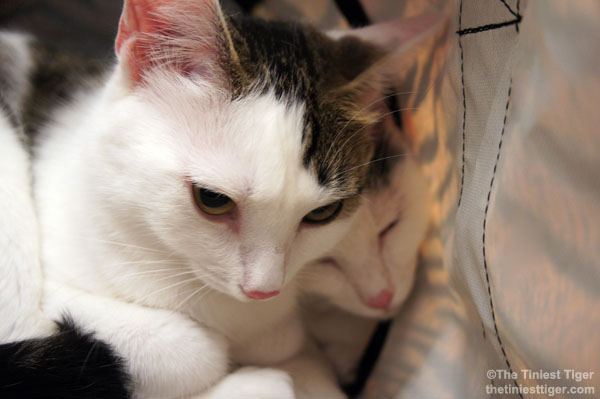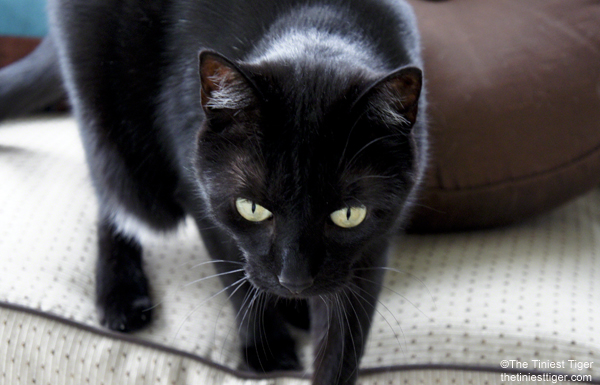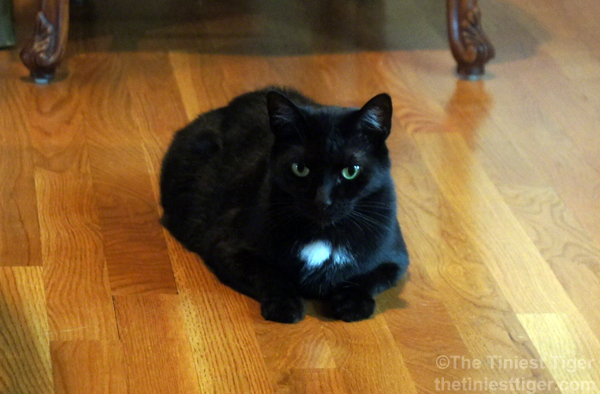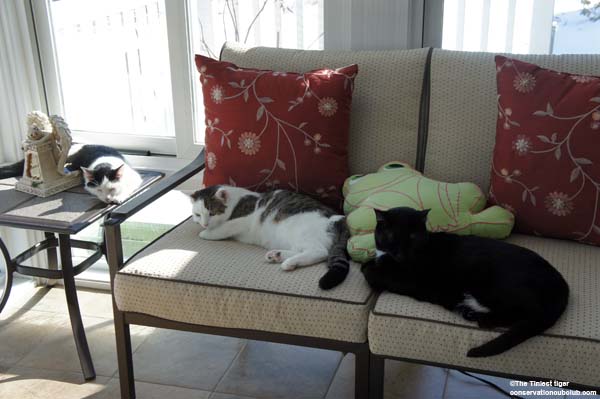Cat Fighting: Non-recognition Aggression Between Cats
When Annie and Eddie went to the Morris Veterinary Clinic for their one year check-up, I made a mistake. It didn’t even cross my mind returning from the vet visit there might be a cat fighting or non-recognition aggression between the cats and Mercy.
We had no difficulty assimilating Mercy into our home with Annie and Eddie late last year. But what I didn’t think about was that Annie and Eddie were in an enclosure right beside Mercy when we boarded them. So, when we came home, all three cats were familiar with each other. They all had the clinic smell on them and each others scent from being in their carriers and riding side by side on the way home. Once we were in the house, everything went smooth and all cats got along.
Perhaps, that is why I didn’t even think about what would happen when Annie and Eddie returned from the clinic this time. Unfortunately, Mercy began to hiss and growl at Annie and Eddie. Annie was more, “What’s your problem?” and Eddie ran under the sofa. I said to Paul, “Oh boy, Mercy is exhibiting non-recognition aggression towards the kittens.” Paul said, “What?” and I explained, “Mercy doesn’t recognize Annie and Eddie because they smell so different from their vaccines and being at the clinic.”
Non-recognition Aggression Between Cats
Non-recognition aggression happens when one cat becomes aggressive toward another cat that shares the home after a period of separation. Although the cause of non-recognition aggression is not certain, it is thought that the newly aggressive cat may be confused by the other cat’s smell.
As humans, this might be hard to understand because the returning cat will look and sound the same. But a cat’s sense of smell is an important part of their communication. Your cat rubs her cheek against an object to deposit her scent. When your cats rub against and groom each other, this is an exchange of their respective scents. Even though Mercy does not groom Annie or Eddie, they still exchange their scents by rubbing up against each other, sharing beds, blankets and eating side by side.
When Annie and Eddie came out of their carrier with unfamiliar scents clinging to them, imagine Mercy thought two strange cats just invaded his territory. The hissing and growling began. We needed to put a plan in motion immediately.
What to look for in your aggressive cat’s behavior
Aggressive behavior in your cat can include hissing, growling, taking a swipe, chasing and cornering and possibly biting. Mercy’s behavior showed hissing and growling. Mercy chased Eddie into the sun room and cornered him behind the Cat Power Tower. Other signs to watch for are constricted pupils, hair standing up along the shoulders, a fat tail, and the appearance of getting ready to pounce on the returning cat.
What to do if you experience non-recognition aggression between your cats.
- Do not let the cats resolve this issue on their own. Cats do not solve problems through fighting. Remember, cats only fight as a last resort. As both predator and prey, your cat is hard-wired to avoid conflict that can cause injury.
- If the aggressive cat is in attack mode, distract the cat by clapping hands loudly, placing a divider such as a large piece of cardboard or blanket between them. You can try squirting the aggressive cat with a water gun if needed.
- Route the aggressive cat into a separate room so that the cat can calm down. You might need to cover the aggressive cat with a blanket to help calm him down and reducing your risk of injury. It may take several hours or even overnight for your cat to fully calm down.
- Do not try to calm down the aggressive cat, let them calm down on their own. An upset cat may lash out towards any person or animal who gets too close. If need be, prepare to keep the aggressive cat confined overnight with food, water, toys with familiar scents and a litter box.
How To Prevent a Cat Fight
We scooted Mercy into the sun room and closed the door. Then closed Annie and Eddie in the bedroom. Next, we provided Mercy with all the things that comfort him, his food, water, toys, and a clean litter pan. Then we closed the door and decided to let him spend the night in the sun room to calm down.
Annie and Eddie were then allowed out of the bedroom. Both kittens did not understand why Mercy was in the sun room. They would walk over to the glass door, sit down and watch him. It was a good sign that Mercy didn’t swat at the glass and gnash his teeth at them.
- In the morning, we placed Mercy’s breakfast on one side of the glass door and left the door open just a crack with a door stopper. We then placed Annie and Eddie’s breakfast on the other side of the glass door and all three cats ate together. They exchanged sniffs through the crack in the door and there was no hissing or growling.
We opened the door, they all exchanged nose taps and life went back to normal.
How to Prevent Non-recognition Aggression Between Cats in the Future
When Eddie returns to the vet later this week, I will make sure I take the proper precautions by keeping Eddie separated from Mercy until he has fully recovered from his treatment and we are able to remove the clinic’s smells.
We will take one of the cat’s fleece blankets and rub it all over Eddie. This will transfer his scent before we leave for the clinic. Then, make sure to transfer Annie’s scent onto the same blanket. When Eddie returns, we will take the same blanket and transfer Eddie’s scent to the blanket. This will make sure both his and Annie’s smell are on the blanket as well as his new smell with lingering smells from the clinic.
Extra precaution will be taken to place Mercy in the sun room until Annie and Eddie are reunited. Then we will go through the same steps we used above to reintroduce Mercy to Eddie.
Placing food, water and litter pans in separate locations allows all the cats to come and go as they please until things return to normal.




My two cats go to the vets together, and when they get home, one of them always hisses and growls at the other one. I can’t understand it, because they both have the same scents! Has anyone ever had this happen?
Just had a similar situation with my two cats. Our little female kitten and our older male cat were best of friends. Our little kitten escaped and was hit by a car and hence had to have a leg amputated. When she came home not only did she smell different but she walked like a completely different animal. Our older cat did not recognize and hissed, growled, attacked her. We tried everything for 4 months- all the tips here and Jackson galaxies tips – everything! One day our older cat had to have surgery himself and he came home with a cone around his head and clipped nails. For the first few days he still acted the same towards our kitten. Then we started noticing the cone was calming him down and was stopping his aggression. We were still feeding them apart. Now after 2 weeks of him wearing the cone they are best of friends again!! They play and eat near each other. Please everyone try this with your aggressive cat, it won’t hurt to try
Just reading all the materials out there on this subject. One of my house cats got out of the house yesterday and was out of the house for probably 6-10 hours. This was the first time he has ever been outside. When I got him back to the house all seemed normal, but later I realized that the other cat in the house did not want anything to do with the other. In everyone’s experience do most cats come full circle over time? These two cats have been together for over 4 years now and were adopted at the same time so it is so weird seeing them at odds (really only from one cat). What is the probability from everyone’s experience that the cats do not overcome this?
it’s been four months since your post and I see nobody answered your questions. I wish someone did. I’m going through this with my two feral cats who are siblings and have been the best of buddies since birth…they’re now a year old. One went to the vet for an hour, came home, and now the other one is very aggressive towards her to her dismay. It’s been four days already and nothing has changed. I didn’t do my research BEFORE taking the kitty to the vet, otherwise I could have avoided this. I wish I knew if they will ever be bonded again. They live in my basement. They were i inseperable, till now. Too late for me to take precautions. Heartbroken.
Hi Stevie. My two cats started enjoying each other’s company approximately 48 hours later. They are now back to normal. I would suggest feeding them treats next to each other. Usually food will at least allow them to be tolerable to each other while they are eating special food or treats. Hope this helps.
thank you so much for your reply. It’s been 72 hours now and nothing has changed. I’m physically sick over this. I feel to blame for breaking the incredible bond they had. I tried the treats, the one kitty is fine with eating next to the aggressive one, but she’s not having any part of it. She growls and hisses and hides. It’s awful. Just awful. I’m so glad your kitties are fine now. I am so depressed over this.
Hi Stevie, I am sorry to hear that your cats are experiencing nonrecognition aggression. It is heartbreaking and I know we went through the same feelings that your are when Annie became aggressive towards Eddie after a surgical procedure. It took about 5-6 days for the bonded pair to return to normal. I too, felt like you did at the 72 hour mark. Try keeping the two cats separated but keep the door opened just a crack with a door stopped. Take a blanket and rub it all over the non aggressive cat making sure to rub along the side of the face too. Place the blanket in with the aggressive cat so that the smell of the other cat will become familiar. You can do the same with the aggressive cat. Rub a blanket or towel all over and then rub that same blanket or towel on the other cat. Return this blanket/towel with both cats’ scents to the aggressive cat’s area. Allow the cats to eat and receive treats where they can smell and see each other through the door.
I think your cat will calm down in the next couple of days. Let me know.
I can’t really separate them…they live in my basement…they’re feral cats. And momma cat also lives in my basement. There are no other rooms down there. Just one big basement. I did try rubbing momma cat’s scent all over the vetted kitty but it didn’t make a diffference. This feral cat family has such a history…too long to get into but they had such a strong bond and have been through so much and I did everything in my power to keep them together, including the very feral momma cat. I hope I didn’t destroy the bond. Thanks so much for responding. It means alot to me.
well, it took over a week for the cats to tolerate eachother and then another week to get back to the way they used to be. Two weeks total. Now, everything is back to normal and they’re back to wrestling and playing together. Thank goodness.
Hi AJ, I hope they have resolved their issue by now, if not read my latest comment about the aggressive cat wearing an Elizabethan cone for a few weeks to see if that calms them down.
Love this article! What great advise. We have a few that love to go after the others who return from the vet…I will now rub their blankets all over them. It can be quite frightening for us & Im sure the kitties. Thanks again! <3
What a fantastic article! I knew nothing about nonrecognition aggression in cats, or that it wasn’t natural for cats to tiff with each other. This really opened my eyes to some behaviors that I need to know about and how to better handle them when they arise. Thank you for posting this!
I have this problem with Wally after I bring Ernie home from the vet. The first time it happened, the swatting and hissing by Wally towards Ernie lasted almost 2 weeks. After that, I talked with my vet and she said I should just bring Wally when I take Ernie to the vet. And that’s what I do. It’s not the most convenient thing to do, but it has worked for the most part.
Island Cat Mom
how scary for everyone. we are lucky (??) that our vet comes to the house…so we don’t have this problem but we certainly know it can be an issue
That is wonderful that your vet comes to your home! Thank you for reading and being a part of The Tiniest Tiger community.
My BearBear when he was still with us hated the vets and he would get this way. Used to have to put him in the bedroom till he calmed down. It would take him hours. He was a mellow cat until then. I still have some grumpy ones but; not as bad. Will try some of your ideas next time.
Sue B
BearBear would get upset when he had to go and remain upset. We have not had that experience yet. Thanks for being a part of The Tiniest Tiger community.